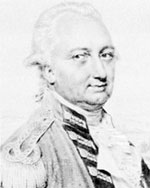影片对白 To your mind, what are appropriate levels of hostile attention?
考考你 现学现卖
2. To one's mind
和 in one's opinion 同义,例如:To my mind we have enough money to start building now.
3. Become of
“Happen to, befall, be the fate of 使遭遇,发生于,变成”的意思,例如:I haven't seen Joe in a year; what has become of his book?
4. Make way
意思是“让路”,例如:Make way for the king!
Make way 还表示“给别人让位”,例如:He resigned to make way for a younger man.
此外,make way 还表示“发展,进步”,如:Is this enterprise making way?
Please make way for the wheelchair.
5. Hell
Hell 在这里是个语气词,用来加强语气,如:“Hell no!”。Hell也可以用来表示惊讶,愤怒,厌恶等感情。
文化面面观
人物:Charles Cornwallis & William Tavington (Banastre Tarleton)
1. Charles Cornwallis, 1st Marquess, 1738-1805, English general and statesman.
 He was commissioned an ensign in the British army in 1756 and saw service in Europe in the Seven Years War. As a member of Parliament (which he entered in 1760), he opposed the tax measures that helped bring on the American Revolution. When the war came, however, he placed himself at the king's service and was sent (1776) to America. He served under Gen. William Howe at the battle of Long Island, in the New Jersey campaigns, and at the battle of Brandywine, acquitting himself with credit in all the engagements. In 1778, Cornwallis became second in command to Sir Henry Clinton, British commander in America. Two years later Cornwallis began the fateful Carolina campaign, which led directly to the Yorktown campaign and the major British defeat that in 1781 ended the fighting. Cornwallis was not held responsible for the disaster and in 1786 became governor-general of India. There he reformed the civil service and the judiciary and distinguished himself in the campaigns against Tippoo Sahib of Mysore. He was created a marquess in 1792 and returned to England in 1794. In 1798, Cornwallis was sent to Ireland as viceroy and commander in chief, and he was stern in repressing the rebellion there in the same year. He worked to achieve the Act of Union (1800), which initiated the unhappy experiment of uniting the Irish and British parliaments, but he resigned (1801) with William Pitt when George III refused to accept Catholic Emancipation. Cornwallis was then commissioned British minister plenipotentiary and helped to draw up the Treaty of Amiens (1802), which temporarily halted the war with Napoleonic France. In 1805 he was again appointed governor-general of India, but he died two months after his arrival there.
He was commissioned an ensign in the British army in 1756 and saw service in Europe in the Seven Years War. As a member of Parliament (which he entered in 1760), he opposed the tax measures that helped bring on the American Revolution. When the war came, however, he placed himself at the king's service and was sent (1776) to America. He served under Gen. William Howe at the battle of Long Island, in the New Jersey campaigns, and at the battle of Brandywine, acquitting himself with credit in all the engagements. In 1778, Cornwallis became second in command to Sir Henry Clinton, British commander in America. Two years later Cornwallis began the fateful Carolina campaign, which led directly to the Yorktown campaign and the major British defeat that in 1781 ended the fighting. Cornwallis was not held responsible for the disaster and in 1786 became governor-general of India. There he reformed the civil service and the judiciary and distinguished himself in the campaigns against Tippoo Sahib of Mysore. He was created a marquess in 1792 and returned to England in 1794. In 1798, Cornwallis was sent to Ireland as viceroy and commander in chief, and he was stern in repressing the rebellion there in the same year. He worked to achieve the Act of Union (1800), which initiated the unhappy experiment of uniting the Irish and British parliaments, but he resigned (1801) with William Pitt when George III refused to accept Catholic Emancipation. Cornwallis was then commissioned British minister plenipotentiary and helped to draw up the Treaty of Amiens (1802), which temporarily halted the war with Napoleonic France. In 1805 he was again appointed governor-general of India, but he died two months after his arrival there.